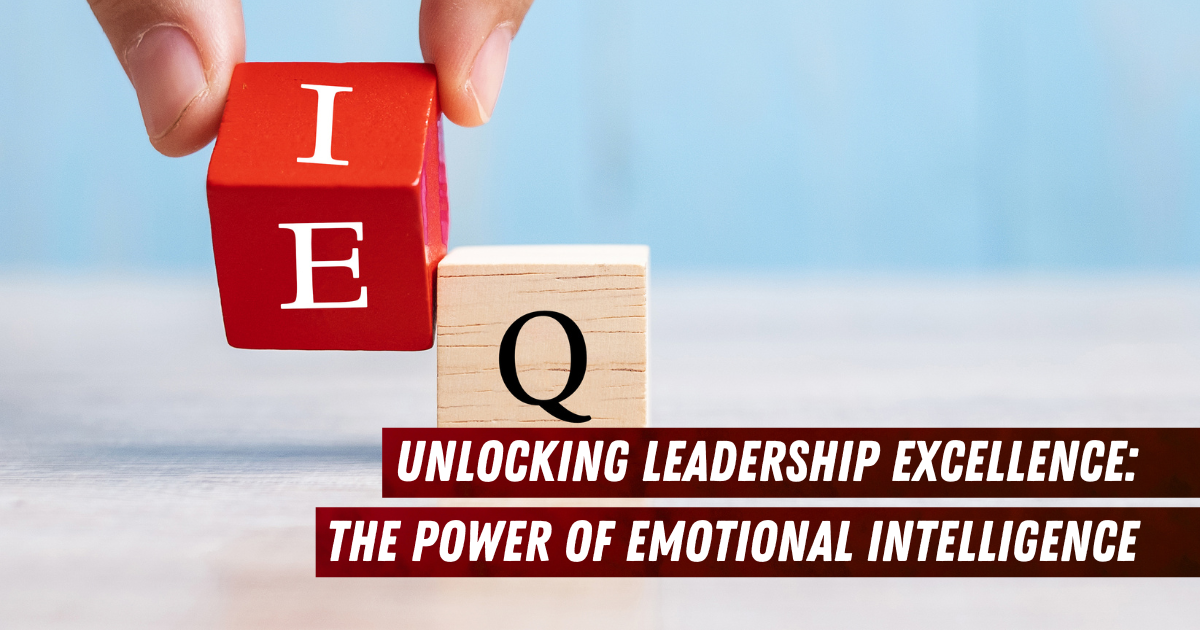Welcome, mid-senior level leaders, to today’s discussion on a topic that holds the key to unlocking your leadership potential: emotional intelligence (EI). In this blog, we will explore why emotional intelligence is crucial for leaders and how it can transform your leadership style, improve relationships, and drive organizational success. As an experienced executive leadership coach, I have witnessed firsthand the profound impact of EI on leaders
Understanding Emotional Intelligence
Emotional intelligence (EI) is a crucial aspect of leadership that goes beyond traditional measures of intelligence. It encompasses self-awareness, self-regulation, motivation, empathy, and social skills. By understanding and embracing these components, leaders can tap into their emotional intelligence to navigate complex interpersonal dynamics and make more informed decisions. It is important to dispel the misconception that emotions have no place in the workplace; instead, leaders should recognize emotions as valuable indicators and leverage them to build stronger connections with their teams.
Enhancing Self-Awareness

Self-awareness is the foundation of emotional intelligence for leaders. By developing a deep understanding of their own strengths, weaknesses, values, and triggers, leaders can lead with authenticity and integrity. Self-awareness allows leaders to recognize and regulate their own emotions, leading to more effective communication and decision-making. To enhance self-awareness, leaders should actively seek feedback, engage in self-reflection, and cultivate mindfulness practices that bring attention to their thoughts, feelings, and actions.
Mastering Self-Regulation
Leaders who can master self-regulation possess the ability to manage their emotions and impulses in challenging situations. By staying calm under pressure and responding thoughtfully rather than reactively, leaders inspire confidence and trust in their teams. Self-regulation also involves adapting to change, maintaining composure during conflicts, and demonstrating emotional resilience. Strategies such as deep breathing exercises, reframing negative thoughts, and seeking support from mentors or coaches can aid in developing self-regulation skills.
Motivating Yourself and Others

Intrinsic motivation plays a vital role in leadership success. Leaders who understand their own values, purpose, and passions are better equipped to inspire and motivate their teams. By setting meaningful goals, providing regular feedback, and recognizing individual and team achievements, leaders can foster a positive work environment where employees feel valued and motivated. Effective leaders also take the time to understand the unique aspirations and strengths of their team members, aligning organizational goals with personal growth opportunities.
Building Empathy and Social Skills
Empathy, the ability to understand and share the feelings of others, is a cornerstone of emotional intelligence in leadership. It enables leaders to build strong relationships, establish trust, and foster collaboration within their teams. By actively listening, demonstrating understanding, and considering diverse perspectives, leaders can create an inclusive work environment where everyone feels heard and valued. Developing effective communication skills, such as assertive expression and non-verbal cues, further enhances leaders’ ability to connect with and influence others positively.
Conclusion

Congratulations! By delving into the world of emotional intelligence, you have taken a significant step toward becoming an exceptional leader. Remember, emotional intelligence is not just a set of skills; it is a mindset that allows you to create a positive work environment, foster meaningful relationships, and drive sustainable success. As you continue your leadership journey, keep nurturing your emotional intelligence and watch how it transforms not only your own effectiveness but also the performance and well-being of your team.
Additional Reading and References
- Goleman, D. (1995). Emotional Intelligence: Why It Can Matter More Than IQ.
- Bradberry, T., & Greaves, J. (2009). Emotional Intelligence 2.0.
- Boyatzis, R. E., & McKee, A. (2005). Resonant Leadership: Renewing Yourself and Connecting with Others Through Mindfulness, Hope, and Compassion.
- “Why Emotional Intelligence Is Crucial for Leadership Success” – Harvard Business Review (hbr.org)
- “The Role of Emotional Intelligence in Leadership” – Forbes (forbes.com)
Remember, developing emotional intelligence is a journey, and it takes time and practice. Don’t hesitate to reach out to an executive leadership coach or explore additional resources to support your growth. Together, let’s unlock your leadership excellence and make a lasting impact in your organization.
Together, let’s unlock your leadership excellence and make a lasting impact in your organization? – Reach out to us and Schedule a call or video conference with Kyle Kalloo or call us right now at: 1-844-910-7111



